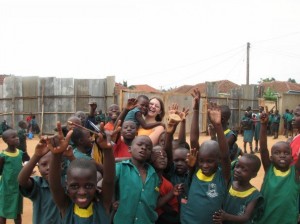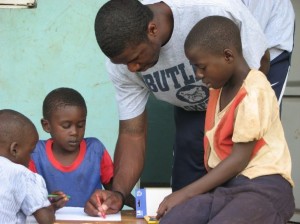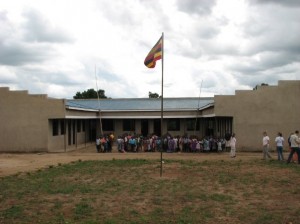Hoosiers Stepping Up to Volunteer in Tough Economic Times Locally and Abroad
Photographs from Building Tomorrow Schools
Before the recession hit last year, Sally Schrock’s Carmel-based non-profit, Second Starts, made an average of 13 deliveries a week, bringing blankets, pillows, kitchenware and other items to families who had been homeless but now have a place to live.
In the last year, that number has jumped to more than 20.
As unemployment rates have skyrocketed, so has the need for help from organizations such as Second Starts.
Filling that need requires more than just the donations Schrock receives at her office in the United Methodist Church rectory basement; volunteers become the driving force behind organizations and their ability to weather a bad economy.
“We’ve always had a strong base of volunteers,” Schrock said.
The United States has a long history of dedicated volunteers. According to volunteeringinamerica.gov, in 2007, 60.8 million Americans, or 26.2 percent of the adult population, gave 8.1 billion hours of volunteer service worth $158 billion.
Indiana ranks 19th in the country for the percentage of residents who volunteer.
For some Hoosiers, the desire to volunteer comes naturally.
“It’s hard to call it work when it’s what you love doing,” Schrock said.
The recession has led others who ordinarily might not volunteer to start lending a hand.
Alan Witchey, volunteer coordinator for United Way of Central Indiana, conducted a study among United Way organizations about their growing need for volunteers.
“This is an opportunity for people to really make a difference in people’s lives,” Witchey said.
According to the study, 55 percent of United Way agencies have seen an increase in volunteers.
Not everyone volunteers for the same reasons.
“Some people are, themselves, going through a major transition,” Witchey said. “Loss of job, loss of hours, loss of income, all those things. So they’re trying to find ways to network, find jobs, to connect, build new skills. But they’re a little bit more ambiguous. They don’t necessarily want to commit to long-term volunteer projects.”
The increase of both demand for resources and bodies to volunteer has forced non-profit organizations to restructure internally. In the last year, United Way eliminated 13 of its 100 staff positions.
“As the economy goes south, you’re forced to think of things differently and you consider different options,” Witchey said. “You think of how you can use volunteers in ways you might have used staff, about how you get people engaged at a time when they’re nervous and scared that their income is decreasing.”
Organizations that do service locally are not the only ones suffering.
George Srour of Indianapolis has made changes to his non-profit, Building Tomorrow, which raises money to build schools in rural areas of Sub-Saharan Africa.
“We’ve really branched out and tried to diversify our funding sources so we’re not depending on the same people, which we had done for a few years,” Srour said.
The organization also coordinates trips for students to travel to Uganda to see their fundraising at work.
“We’ve had a trip the last three Januaries,” Srour said, “but I don’t think we’ll have one in 2010 simply because students are feeling a bit more pinched in terms of their resources to be able to travel.”
For Building Tomorrow, students are essential to the mission.
“It’s rewarding to be on different college campuses and to see the enthusiasm for the cause, not just for Building Tomorrow, but for philanthropy in general,” Srour said. “Students really have the power to create social change.”
Srour said he is occasionally criticized, particularly in times of a bad economy, for focusing Building Tomorrow’s mission on Uganda instead of the United States, where thousands of children in Indianapolis need help as well.

Butler University graduate Beth Kristinat traveled to Uganda to work at a Building Tomorrow school in the city of Kampala.
“It’s been our experience that someone who travels to Uganda and sees what they see, and works with our students, and works with our communities, comes back much more energized 20 times over what it cost them to get there,” Srour said. “I think by seeing what they do through our work in Uganda, it makes them more socially conscious and more aware even in their local community.”
There’s also the cost factor, Srour said. “The $45,000 Building Tomorrow spends on a school in Uganda wouldn’t pay for four walls around a classroom in the United States.”
But Srour encourages Americans to volunteer in any capacity, no matter the location.
“A lot of us have something we can give, even if it’s just time, that can help a family, that can help anyone who’s in need,” he said.
Witchey said he encourages people to volunteer during tough times by telling them to think about what they will say to their children years down the road about how they made it through the recession.
“Do you want to look back and be able to tell your kids, your grandkids, people you know, that you were actively stepping up to be part of the solution, or do you want to say, ‘I was scared, I took care of myself?’” Witchey said. “I think most people, when they think about it in those terms, they know. ‘This is a difficult time. I want to step up and make a difference.’”
For Schrock and her Second Starts volunteers, there is the opportunity to make a difference every day.
“This morning we delivered to a family that had five children,” Schrock said. “And that’s just so gratifying.”
Second Starts volunteer Paula Barbour agreed. Barbour worked as a counselor at Brebeuf High School, linking students with various volunteer projects. Now retired, she spends every Wednesday in the basement of the church.
“It’s just a joy to help people,” she said.
Video: Volunteers and Non-Profit Organizations
How Volunteering Can Benefit You As the Volunteer
-Résumé building
-Acquire skills you can’t get in a job
-Meet new people
Ways to get involved:
Filed Under: News



